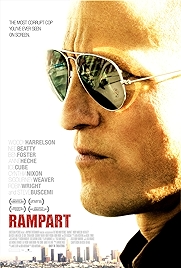A movie for every day of the year – a good one
3 March
Rodney King beating caught on camera, 1991
On this day in 1991, one of the inaugural events of the age of citizen journalism occurred after paroled felon Rodney King was stopped by police after a high speed chase and then beaten by five officers. King was drunk and had been trying to outrun the police, knowing that arrest while driving under the influence would mean a violation of his parole and an immediate return to prison. George Holliday’s videotape of the beating of Rodney King was what made the event important. He’d switched his camera on just as police were tasering King for the second time; but it was the fusillade of baton strikes to King’s body as police deployed their “swarm” tactic – standard procedure against an unco-operative subject – that were eye-catching. Though King later sued the city of Los Angeles and was awarded $3.8 million dollars, plus expenses, the trial of the police for the use of excessive force resulted in them being acquitted. Riots broke out in Los Angeles, resulting in the death of 54 people, the arrest of 7,000, and millions of dollars’ worth of damage.
Rampart (2011, dir: Oren Moverman)
Rampart is the story of an old world cop in a new world he doesn’t understand, a Dirty Harry surrounded by diktats of appropriateness and proportionality. It’s also a very nice role for Woody Harrelson who, after playing an inbred hick shooting zombies in one film too many (or does Zombieland just feel like more than one movie?), reminds us that he’s also an actor. Harrelson plays the anachronism who listens to shock jocks, beats up witnesses, intimidates rookie female members of the force, is quite possibly married to a member of his own family (if I’ve got the fact wrong there, then I’m in the right area in spirit). His force nickname is Daterape, enough said. “I am not a racist,” says Rampart, after being hauled in for going a bit Rodney King on a black motorist he’s taken a dislike to. “The fact is I hate all people equally.”
These lines appear in some of the most amusing sections of the film, when he’s being questioned by his concerned superiors, in particular Sigourney Weaver, whom he has also taken a dislike to, partly because he resents having a boss, mostly because she’s a woman. He is, in his defence of himself to her, “the one cop who gets it.” This is a cop up to his neck in dirt, in other words, because that’s the way it goes when you work the streets. The strength of Oren Moverman’s film, script by James Ellroy and Moverman, is that it doesn’t utterly condemn Harrelson’s David Brown. We see Brown swaggering on duty and kind of pathetic off duty. Moverman plants us in Brown’s head with his feverish camera movement and livid colours, lifts ambient sound quite high in the mix. We don’t love Brown, but we do understand him; we’re not rooting for him, but we are rooting for him not to get caught. Ned Beatty arrives, adding further weight to the idea that Rampart at some level is a 1970s love-in – but it’s not the timid Beatty of Deliverance, rather a nastier character, there to nudge us that, no, this is not the way police affairs should be conducted, never should have been in fact.
Moverman handles his large cast of real pros with skill, though he could be accused of not having read the Don Siegel book of directing – a touch of Dirty Harry economy wouldn’t go amiss. But there’s absolutely no need to have background knowledge of real incidents at Los Angeles’s Rampart division – 70 cops in the anti-gang unit accused of corruption. This film boils it all down for us into the character of one very rancid man.
Why Watch?
- Woody Harrelson’s great performance
- A supporting cast that’s just as good – Ned Beatty, Anne Heche, Sigourney Weaver, Ben Foster
- Bobby Bukowski’s urgent cinematography
- Beautifully done 1970s pastiche
Rampart – at Amazon
I am an Amazon affiliate
© Steve Morrissey 2014

